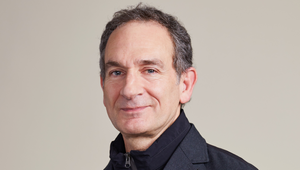
George Russell: High-Performance Teams Need “Troops Behind the Vision”

Mercedes driver George Russell has labelled strong communication and trust in decision-makers as key to an organisation's success.
George told BBDO global CEO Nancy Reyes that all partnerships and collaborative creative work require a level of authenticity for a team to truly gel.
Speaking at the Omnicom Space at Cannes last week as part of the ‘Every Dream needs a Team’ panel, George said when working with multiple partners, having an inconsistent vision will ultimately be costly to brands.
“Authenticity, making sure the vision is aligned between the team, [and that they’re] actually trying to learn, is essential,” he explained.
“[Having been] in so many partnerships over the past couple of years, when it is a creative idea that I'm enjoying … it ultimately has greater reach and is more impactful for everybody. It’s working closely with the individual who's in front of the camera to understand what is really important.
“An organisation; they’re operating consumers. We need to trust in our colleagues at the very highest level, and I think that's why we're trying to lead by example. Every single week, that motivates the people I'm working with. Driving cars is integrated into people’s emotions and the emotional side is probably the most important factor of the sport.”
George described a well-functioning team like a rowboat, with everyone doing their job in harmony with the crew.
“You need that strong communication between you and all of your coworkers. What is the vision? You need the troops behind it.
“These rowing boats have eight people rowing and two people steering – not 10 people steering and nobody rowing. That is where we as a sports team, as a business, need trust in those decisions to run in the same direction.
“That's essential to your success.”
Mercedes AMG Petronas commercial director Dominic Reilly added the shifting Formula 1 fanbase is providing an opportunity for new motorsports content, requiring evolving partnerships for F1 brands.
“Historically, motorport is very technology-focused,” Dominic explained.
“While that’s still hugely important, the onset of Netflix and ‘Drive to Survive’ as well as all the multiple channels that now show Formula 1 has driven a new series of fans. Our fastest growth is now with females, they’re 42% of our global fans.
"What's happening is brands that are associating themselves with the sport have shifted as well.”
Now, F1 teams need to innovate in “every angle area” including technology, but also hospitality and content.
“In our culture, it’s a no-brainer, you have permission to fail. We want the bar to be as high as possible. It's an Arms Race for technology, but humans are involved in it, who are performing at the very highest level.
“Psychological safety is really important to us. Anyone can raise their hand and say, ‘totally, I don't agree with that’, as everyone's proven to be as creative as possible.
“In sport, content is king. This subject matter shouldn't be a fear of failure, because you'll fail.”
Global VP of Adidas brand communications Florian Alt agreed with Dominic, noting that the more a brand feels like a partner, the more secure the relationship is, and the better the final product.
“It’s not a [question] of six months, eight months. Good ideas take time and need to be reintroduced over years and years.
“Then you need to keep that focus … There's a lot of pressure to get it right, but making mistakes makes it better, and leads to a message that is relevant.
“It makes things so much easier, because not only will they understand the context they operate in, but they will also be able to bring their own review and creativity to it. The important thing is, as a brand ecosystem, make sure everybody who's involved in this undertaking knows what you need and what you want consumers to take away from us.”
He added, “Trust is one of the most important elements when you start.”
“If you don't trust your partners, it will be almost impossible to achieve or create something that is really unique, and therefore, really give them a chance to change the conversation. And then, when we talk about high-performing cities, whether they are in the picture of the rich, they usually don't want to strive. They want to continuously learn. They want to adopt. They want to evolve.”












